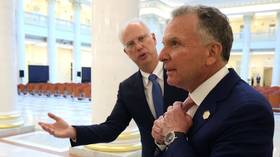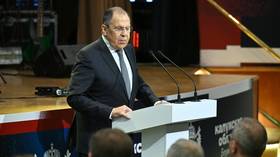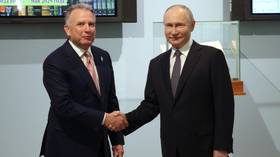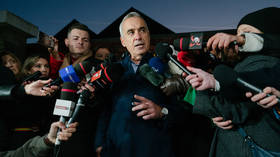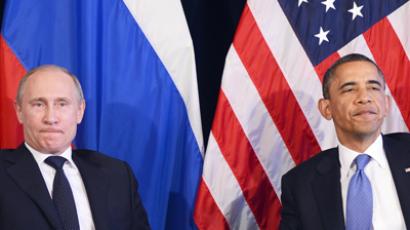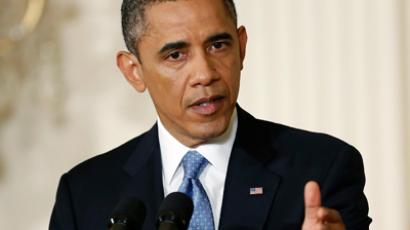Four more years: Will Obama’s next term be paved with progress or broken promises?
All eyes were on Washington today as US President Barack Obama recited the oath of office in front of an estimated 800,000 people. As the leader prepares for the next four years, the world waits to see whether he’ll follow through with his previous pledge
Obama’s inaugural speech was filled with inspiration, as the leader promised to “support democracy from Asia to Africa; from the Americas to the Middle East,” while peacefully resolving conflicts with other nations.However, if the leader’s first term is any indication, his promises may not be so easy to fulfill.
Economic issues
Five years since the beginning of the financial crisis, Americans are still waiting for a sign of fiscal improvement. Economic recovery has taken longer than most people ever imagined – including Obama.“If we can’t get this done in three years, this is going to be a one-term proposition,” Obama said early in his presidency. Fast forward to 2013, Obama is beginning his second term, despite the fact that the US unemployment rate is still hovering around 7.9 per cent.It seems there is little indication of improvement anytime soon. “It will take more than a few years to solve challenges that have built up over decades,” Obama said during his 2012 campaign.The freshest of Obama’s economic battles is the nation’s traditional Fiscal Cliff showdown. In February, congressional Republicans are expected to fight the president once again, demanding that funding for Social Security, Medicaid and Medicare be slashed.As Congress gears up for the debate, the nation remains divided on the most effective way to handle the dispute.
Gun control
Last Wednesday, Obama called on Congress to pass a number of proposals that could allow for sweeping new gun laws across the country.If approved, the measures would ban the buying and selling of certain assault weapons, close loopholes that circumvent background check requirements, impose limits on ammunition purchases and more.“If there was even one thing we could do to reduce this violence, if there is even one life that can be saved, then we have an obligation to try it. And I’m going to do my part,” Obama said.But “doing his part” may be easier said than done. In fact, many say the proposal has little or no chance of making it through Congress.“In this country I don’t think [gun control] is going to happen anywhere in the near future, because we are a country that is very deeply in love with our guns,” constitutional lawyer Roger Pilon told RT.Obama’s battles with Congress are nothing new. But while it may be difficult to pass laws within the US, it’s a bit easier for the leader to focus on foreign policy. “Presidents who have trouble with Congress like to do international things because they have to worry about Congress much less,” political opinion writer Brent Budowsky told RT.
Foreign Policy
From Iran to Russia, critics are quick to speculate on how the Obama administration will handle foreign policy over the next four years. In the past, Obama has stated that “all options remain on the table” to keep Iran from developing a nuclear weapon.However, some say the selection of Chuck Hagel – Obama’s pick for Defense Secretary – acts as an early sign that the administration will monger less war than in years past. Why? Because Hagel is against launching a pre-emptive strike on Iran.But Middle East experts aren’t so easily swayed. “I’d bet a certain amount of money we will hear the words ‘all options are on the table' come out of his mouth,” Middle East expert Flynt Leverett told RT. Hagel’s views on Iran are countered with those of John Brennan, the man nominated to lead the CIA. “Brennan is someone who will continue many of the covert programs at the CIA, and who will be very much to Israel’s liking and serve to undermine any attempts or possibilities for a real rapprochement or coming to terms with the Islamic Republic of Iran,” Hillary Mann Leverett, CEO of political risk consultancy Strategic Energy and Global Analysis, told RT. In his speech, Obama mentioned the upcoming departure of American troops from Afghanistan. However, it remains debatable whether a decade of war has left Afghanistan – or America – any better off. “There are extensive drone attacks still going on that I think put Americans in international environments in great danger,” security analyst Patricia DeGennaro told RT. The Obama administration’s movements surrounding Syria have been frowned upon too, with many criticizing the US for giving the country's insurgency strategic information. “It’s a violation of international law and aggression under the UN charter. Plus, we have the very worrisome deployment of American missiles in Turkey, as if it were Turkey who needs defense against Syrian aggression rather than the other way around,” US Senate foreign policy advisor James Jatras told RT.And if talks of moves to topple Syrian President Bashar Assad come to fruition, Jatras says, the Obama administration isn’t prepared for a post-Assad Syria. “One of the problems with the various American-led interventions over the years, whether we’re talking about Bosnia, Kosovo, Libya, and hopefully not in the future, Syria, is that the goal immediately defined comes first, and we worry about the consequences later. Look, for example, at the aftershocks of Libya in Mali and Algeria,” Jatras said.Obama faces yet another obstacle when it comes to Mali, with African forces asking for Western allies to do more to save the country from Islamist militants. Thus far, however, the US has ruled out the deployment of ground troops.Closer to home is the on-going controversy surrounding Guantanamo Bay. The prison camp has been in the limelight since 2009, when Obama gave orders for it to be closed by January 22, 2010. However, it remains open and operational. It’s yet another example of Congress overpowering the president, bundling it with the National Defense Authorization Act, which serves as the overall defense budget for the country.Obama has the power to veto the entire act, but not to individually challenge the administration of Guantanamo Bay. Obama has threatened to do so several times, as Congress has imposed more and more stringent measures on Guantanamo – yet the president has backed down on every occasion.While the future of Obama’s foreign policy remains largely unclear, the future of his domestic agenda seems easier to predict. That is, unless he develops a sweeter relationship with Congress, there’s a good chance that many of his ideas will never make it beyond inspiring speeches.




